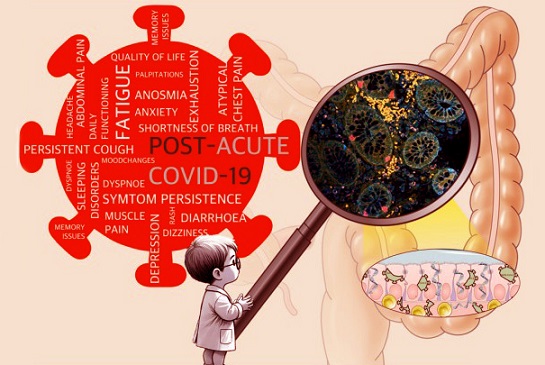Nikhil Prasad Fact checked by:Thailand Medical News Team Dec 21, 2024 3 months, 3 weeks, 6 days, 1 hour, 13 minutes ago
Medical News: Unveiling the Mysteries of Long COVID
Post-Acute Sequelae of SARS-CoV-2 infection, commonly called Long COVID, has surfaced as one of the most complex and persistent health challenges following the COVID-19 pandemic. This condition encompasses a broad spectrum of symptoms, ranging from chronic fatigue and brain fog to gastrointestinal distress and heart palpitations, often lingering for months after the acute infection resolves. Intriguingly, even individuals with mild or asymptomatic COVID-19 cases have reported debilitating long-term effects.
 Insights into the Gut’s Role in Long COVID
Insights into the Gut’s Role in Long COVID
While the exact mechanisms behind Long COVID remain elusive, an emerging body of research has turned its focus toward the gut - commonly referred to as the body’s “second brain.” The intricate role of the gut microbiome, gut-brain axis, and immune responses in the development of Long COVID has been the subject of rigorous investigation. This
Medical News report delves into these fascinating developments, shedding light on groundbreaking discoveries that could redefine how we understand and treat this condition.
The Gut’s Role in Health and Disease
The human gut is home to a dynamic ecosystem of microorganisms collectively known as the gut microbiome. This community includes bacteria, viruses, and fungi that play crucial roles in digestion, nutrient absorption, and immune modulation. The gut microbiome also interacts closely with the central nervous system (CNS) through the gut-brain axis, a bidirectional communication network involving neural, hormonal, and immune pathways. Disruptions to this delicate system have been linked to a myriad of health conditions, including inflammatory bowel disease, depression, and autoimmune disorders.
Researchers from the Department of Internal Medicine I at the Medical University of Innsbruck, Austria, have been at the forefront of uncovering how SARS-CoV-2 affects this intricate system. Their studies suggest that the virus’s persistence in the gut and its impact on the microbiome could contribute significantly to the prolonged symptoms of Long COVID.
SARS-CoV-2’s Impact on the Gut
SARS-CoV-2 primarily targets the respiratory system but can also infect the gastrointestinal tract through the angiotensin-converting enzyme 2 (ACE2) receptor, which is abundantly expressed in gut epithelial cells. This viral invasion disrupts the intestinal barrier, leading to increased permeability or “leaky gut.” Consequently, harmful substances and microbial products can enter the bloodstream, triggering systemic inflammation.
Patients with acute COVID-19 frequently report gastrointestinal symptoms, such as diarrhea and nausea. These issues often correlate with a higher viral load and worse clinical outcomes. More importantly, the disruption caused during acute infection may lay the groundwork for the chronic symptoms seen in Long COVID.
Persistence of SARS-CoV-2 Antigens
A pivotal finding by researchers in Austria has
been the detection of SARS-CoV-2 antigens lingering in the gastrointestinal tract long after the initial infection. These viral remnants may evade the immune system by residing in less accessible areas of the gut, perpetuating inflammation and immune activation. Notably, this persistence has been linked to ongoing symptoms like fatigue and cognitive dysfunction in Long COVID patients.
Follow-up studies revealed that the clearance of these antigens from the gut is associated with the resolution of Long COVID symptoms. This discovery paves the way for potential therapeutic approaches aimed at targeting viral reservoirs within the gastrointestinal system.
Gut Dysbiosis and Immune Dysregulation
The gut microbiome’s composition undergoes significant changes during and after acute COVID-19. Beneficial bacteria such as Faecalibacterium prausnitzii often decline, while opportunistic pathogens increase. This imbalance, known as dysbiosis, impairs gut barrier function and exacerbates inflammation.
Dysbiosis also disrupts the gut-brain axis, potentially affecting serotonin production. Approximately 90% of the body’s serotonin, a neurotransmitter crucial for mood regulation and gastrointestinal motility, is synthesized in the gut. Reduced serotonin levels have been linked to the neuropsychiatric symptoms commonly reported in Long COVID, including depression and anxiety.
Potential Therapeutic Strategies
Addressing gut-related issues in Long COVID may hold the key to alleviating symptoms. Although current evidence is still emerging, several potential interventions have been proposed:
-Probiotics and Prebiotics: These supplements aim to restore microbial balance in the gut. While promising, their efficacy in Long COVID requires further investigation.
-Dietary Interventions: Diets rich in fiber and fermented foods may support gut health and reduce inflammation. However, personalized approaches tailored to individual microbiome profiles are essential.
-Fecal Microbiota Transplantation (FMT): Although highly experimental, FMT has shown potential in restoring gut microbiome diversity and alleviating symptoms in some patients.
-Targeted Antiviral Therapies: Drugs that eliminate residual viral RNA or proteins from the gut may offer a novel treatment avenue, though their effectiveness remains to be conclusively demonstrated.
Broader Implications and Future Research
The multifactorial nature of Long COVID underscores the need for multidisciplinary approaches in both research and clinical practice. Understanding the gut’s role in this condition could lead to the development of diagnostic biomarkers, enabling earlier detection and personalized treatment strategies.
Advanced technologies such as metagenomics and metabolomics are expected to play a pivotal role in this endeavor. These tools allow researchers to study the gut microbiome’s composition and its interactions with the host in unprecedented detail, uncovering new therapeutic targets.
Conclusion
The gut’s involvement in Long COVID highlights the intricate interplay between the microbiome, immune system, and nervous system. Research from institutions like the Medical University of Innsbruck underscores the potential for gut-targeted therapies to revolutionize our approach to managing this condition.
While significant progress has been made, much work remains to translate these findings into clinical practice. Longitudinal studies and integrative approaches combining advanced technologies and personalized medicine will be crucial for unlocking the complexities of Long COVID.
As we deepen our understanding of the gut’s role in this condition, there is hope for more effective treatments that address not just the symptoms but the underlying mechanisms of Long COVID.
The study findings were published in the peer-reviewed journal: Yale Journal of Biology and Medicine.
https://pmc.ncbi.nlm.nih.gov/articles/PMC11650913/
For the latest COVID-19 News, keep on logging to Thailand
Medical News.
Read Also:
https://www.thailandmedical.news/news/probiotics-as-a-potential-ally-in-managing-covid-19-gastrointestinal-symptoms
https://www.thailandmedical.news/news/microbiota-dysbiosis-and-serotonin-dysregulation-linked-to-long-covid-gastrointestinal-symptoms
https://www.thailandmedical.news/articles/long-covid
